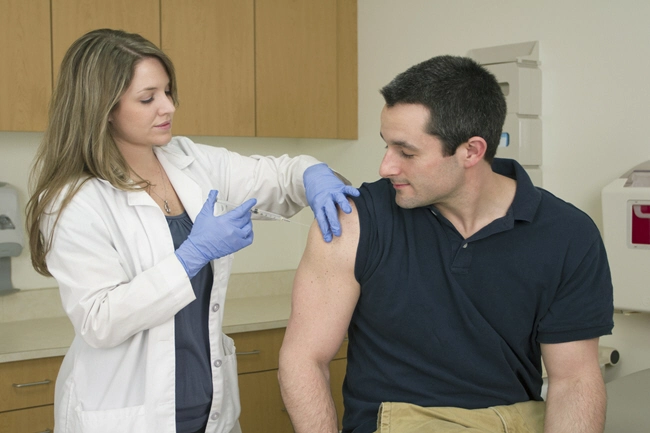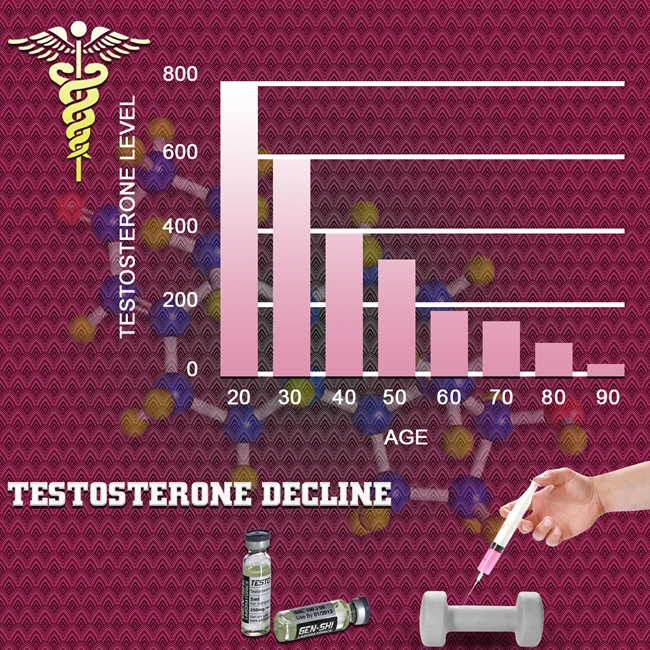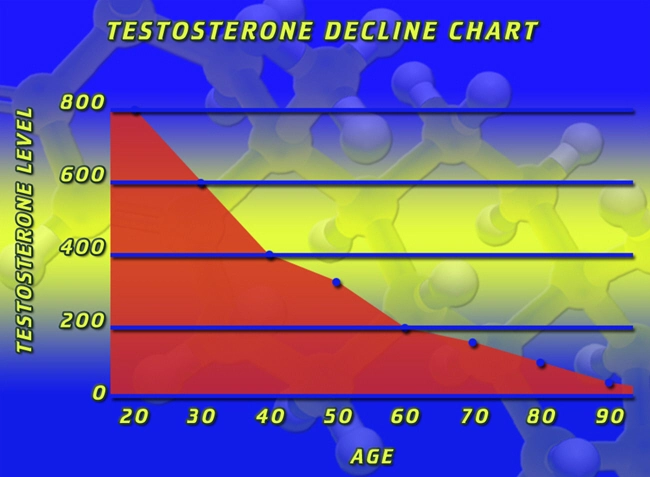
 One thing most people agree on is this: aging is not for sissies.
One thing most people agree on is this: aging is not for sissies.
For most men, while aging, the combination of constant fatigue, increasing weakness and loss of endurance, nagging aches and pains that only get worse, and a severely diminished libido result in depression...sometimes severe and hopeless depression, even suicide.
Therefore, it should come as no great shock that a growing army of men is willing to try Testosterone Replacement Therapy (TRT).
In 2013, more than 2.3 million American men used testosterone gels, patches, pellets, and injections.
Video Link: https://vimeo.com/252392476
Video Download: Click Here To Download Video
Video Stream: Click Here To Stream Video
This figure is twice the number of men undergoing TRT as recently as 2008.
This growing number is despite the dire warnings from many medical experts that they are increasing their chances of a heart attack and other health complications.
The Food and Drug Administration (FDA) has Entered the Debate
The Food and Drug Administration is determining whether taking hormone supplements, which might slow down the natural hormone decline, is safe.
As the FDA is gathering evidence and determining what, if any, regulatory action to take, the questions remain unanswered and controversial.
What are the pros and cons of testosterone-replacement drugs?
Wall Street Journal health editor Melinda Beck delves into this debate by getting the opinions of several physicians and researchers and gives us an up-to-date look at the FDA's current thinking on this heated topic.
An FDA advisory panel in September of 2014 proposed that the agency demand that testosterone-product manufacturers study the likelihood of cardiovascular risks.
The 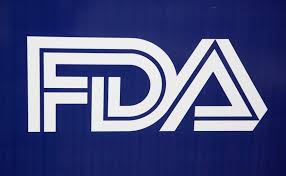 panel also suggested new labeling to caution that testosterone has not been proven to be safe and beneficial for boosting age-related drops in testosterone.
panel also suggested new labeling to caution that testosterone has not been proven to be safe and beneficial for boosting age-related drops in testosterone.
These drops are, of course, the reason that so many men are eager and desperate to do something about it.
According to an FDA review, less than half of the men undergoing testosterone replacement therapy (TRT) have been diagnosed as suffering from low testosterone ("Low-T").
The rest want to attempt to halt the aging process, or at least slow it down in the hope that future medical technology may deliver on the promise of turning back the hands of time, allowing men to regain their youthful exuberance.
It's uncertain what the FDA's next move will be if there is the next move.
But regardless of FDA action, physicians will still be allowed to prescribe the drugs “off-label.”
And there is no shortage of men willing to assume the risk of adverse side effects from TRT in the life-and-death, do-or-die struggle against aging.
The Ugliness of Aging
 Aging decimates a man's testosterone levels, and the results are anything but pretty.
Aging decimates a man's testosterone levels, and the results are anything but pretty.
Here are some of the symptoms of this hideous development:
- Constant fatigue
- Reduced or completely vanished sex drive
- Unwanted accumulation of ugly, disease-producing fat
- Shrinking muscle mass, with resultant weakness
- Constant, ever-increasing joint aches and pains
Some Possible Risks of Testosterone Replacement Therapy:
- Heart attack
- Stroke
- Coronary artery disease
- Blood clots
What Testosterone Is
Testosterone is a male steroid hormone that rises sharply when boys hit puberty.
It affects the entire body: voices deepen, shoulders broaden, sperm production begins, and height, strength, and sex drive all increase.
In short, it is what makes men MEN.
As men age, levels peak in the late '20s and decline gradually, about 1% a year.
In contrast, estrogen levels drop off much more sharply in women at menopause.
So does the small amount of testosterone women make in their ovaries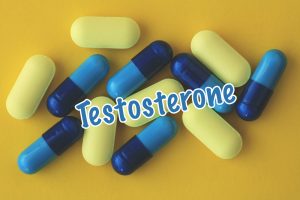 affect energy, mood, and sex drive, as in men?
affect energy, mood, and sex drive, as in men?
Besides lower energy, testosterone declines are also associated with more fat, depression, and memory lapses.
Such changes may occur more dramatically in some men than others, depending on lifestyle and genetics.
They also can be symptoms of thyroid problems, obesity, alcoholism, and other conditions.
The Medical Pro's Weigh-in
“Aging is associated with a lot of other conditions — poor eyesight, poor hearing, bad joints, bad blood vessels, cancer — yet we treat them because it improves the quality of life and longevity. Why not low testosterone?” says Abraham Morgentaler, a Harvard Medical School urologist and director of Boston's men’s health clinic.
‘Men all want to feel younger and more virile, and they somehow have come to believe that low-T medication is the fountain of youth. But we don’t know whether it’s safe. ’
—Steven Nissen, chairman of cardiovascular medicine at the Cleveland Clinic
 There is little consensus even among medical pros on what level of testosterone constitutes “low” in older men.
There is little consensus even among medical pros on what level of testosterone constitutes “low” in older men.
Some doctors say a total testosterone level of below 325 nanograms per deciliter at any age indicates hypogonadism, the official term for low-T.
Apparently, some doctors aren’t checking patients’ testosterone levels.
An FDA analysis of insurance claims found that for 21% of men who filled testosterone prescriptions, there was no record of a lab test, either before or afterward.
Safety concerns have long plagued testosterone products.
Large doses, which some bodybuilders take to bulk up, have been linked to aggression.
Testosterone isn’t recommended for men with a history of prostate cancer, although recent studies show it doesn’t raise the risk of developing prostate cancer, as was once thought.
A Controversial Study
The heart attack concerns arose this past November again when a widely publicized study in the Journal of the American Medical Association (JAMA) of nearly 9,000 veterans being evaluated for coronary artery disease discovered that those who used testosterone had a 29% higher risk of heart attack and stroke than those who didn’t.
Testosterone prescriptions dropped precipitously from about 600,000 a month before the JAMA study was published to about 500,000 a month currently.
The study kicked off an intense debate and some harsh criticism from physicians who support testosterone therapy.
Other studies on cardiovascular risks from testosterone have had mixed results.
In July, Canada’s drug regulatory agency said its review had found “a growing body of evidence” associated with testosterone use of “heart attack, stroke, blood clots, and increased or irregular heartbeat.”
The agency ordered makers of testosterone to add a warning to their labels.
A day later, the FDA rejected a petition from a nonprofit, consumer-watchdog organization, Public Citizen Health Research Group, for stronger warnings in the U.S., concluding that there was insufficient evidence of a risk.
Currently, the products’ U.S. labels mention the potential for sleep apnea, congestive heart  failure, and low sperm counts and warn that women or children exposed to testosterone could develop male characteristics, such as chest hair.
failure, and low sperm counts and warn that women or children exposed to testosterone could develop male characteristics, such as chest hair.
Some testosterone-treatment proponents admit the drugs could increase cardiovascular risks because they boost levels of red blood cells, which make blood thicker.
But they say donating a pint of blood every few months can keep these levels within normal ranges.
“If a patient is carefully monitored, it’s not a concern,” says Mark Rosenbloom, who runs a clinic in Northbrook, Ill., specializing in testosterone- and other hormone-replacement therapy.
After two days of hearing expert testimony, the FDA advisory panel voted overwhelmingly that more data was needed to assess the heart attack risks of testosterone products.
The committee also recommended that labels should be changed to discourage the drugs’ use for “age-related” declines of the hormone.
Testosterone treatment can be expensive: some treatment regimes cost as much as $300 a month.
Some men might have a more difficult time obtaining insurance coverage for the drugs if the FDA decides to mandate changes in labeling the product.
In their comments to the panel, testosterone-product makers said the lack of extensive, controlled studies makes it “difficult to interpret” the long-term impact of the treatment.
 For many men, testosterone treatment has changed their lives.
For many men, testosterone treatment has changed their lives.
Bob Mattioli, managing partner of a medical-device training company in Braintree, Mass., started getting hormone injections about 15 years ago when he turned 50 and started feeling “dragged out, fatigued and general malaise,” he says.
Now he exercises vigorously, with a broad range of strength-building, body-weight calisthenics, and brisk walks every day.
“Is testosterone doing that for me? I don’t know,” he says. “I’m doing that for me, and I think it’s a good combination.”
References
A Harvard expert shares his thoughts on testosterone replacement therapy
Testosterone Replacement Therapy
Contact Us Today For A Free Consultation
Dear Patient,
Once you have completing the above contact form, for security purposes and confirmation, please confirm your information by calling us.
Please call now: 1-800-380-5339.
Welcoming You To Our Clinic, Professor Tom Henderson.

- LabCorp Announces a Change to the Testosterone Reference Range [Last Updated On: April 16th, 2025] [Originally Added On: June 23rd, 2019]
- Important Facts About Testosterone Therapy Before Buying [Last Updated On: April 18th, 2025] [Originally Added On: July 13th, 2019]
- Soy: Does it Lower Testosterone? [Last Updated On: October 18th, 2024] [Originally Added On: August 30th, 2020]
- Testosterone Treatments May Successfully Reverse Type-2 Diabetes in Some Men [Last Updated On: April 15th, 2025] [Originally Added On: November 13th, 2020]
- Testosterone Replacement Therapy (TRT) May Prevent Heart Attacks and Diabetes [Last Updated On: April 21st, 2025] [Originally Added On: November 17th, 2020]
- Did You Know? Recent Studies Have Confirmed the Link Between Low Testosterone (“Low-T”) and Depression. [Last Updated On: April 17th, 2025] [Originally Added On: January 10th, 2021]
- New Study Finds Testosterone Does Not Increase Your Heart Attack Risk [Last Updated On: April 14th, 2025] [Originally Added On: January 11th, 2021]
- The Great Testosterone Debate [Last Updated On: April 20th, 2025] [Originally Added On: January 14th, 2021]
- Testosterone Replacement Therapy Lowers Heart Attack Risk [Last Updated On: April 19th, 2025] [Originally Added On: January 18th, 2021]
- New Study Says: The Benefits of Testosterone Replacement Therapy Outweigh The Risks [Last Updated On: April 22nd, 2025] [Originally Added On: January 19th, 2021]
- Male Menopause. Fact or Fiction ? [Last Updated On: April 23rd, 2025] [Originally Added On: January 20th, 2021]
- Testosterone: How Much Do You Really Know About This Masculine Hormone? [Last Updated On: October 6th, 2024] [Originally Added On: February 9th, 2021]
- Low-T: What are healthy levels of Testosterone and why is it difficult to measure? [Last Updated On: September 11th, 2025] [Originally Added On: April 3rd, 2021]
- Testosterone Therapy May Be Good for the Heart if You Have Low-T [Last Updated On: May 3rd, 2025] [Originally Added On: July 21st, 2021]
- A Recent Study Concludes: Testosterone DOES NOT Cause Prostate Cancer [Last Updated On: September 14th, 2025] [Originally Added On: August 16th, 2021]
- New Study Concludes: Boosting Testosterone Levels Lowers Men's Death Risk [Last Updated On: May 11th, 2025] [Originally Added On: August 20th, 2021]
- Testosterone Replacement Therapy Slows Prostate Cancer! [Last Updated On: April 2nd, 2025] [Originally Added On: September 13th, 2021]
- Research proves that Testosterone Therapy Boosts Fertility! [Last Updated On: April 5th, 2025] [Originally Added On: September 26th, 2021]
- Free Testosterone and Sex Hormone-Binding Globulin [Last Updated On: April 6th, 2025] [Originally Added On: October 15th, 2021]
- Testosterone Does Not Cause Heart Attacks [Last Updated On: April 7th, 2025] [Originally Added On: October 15th, 2021]
- Testosterone and Women [Last Updated On: April 8th, 2025] [Originally Added On: October 15th, 2021]
- Testosterone and Metabolic Syndrome [Last Updated On: April 3rd, 2025] [Originally Added On: October 15th, 2021]
- Testosterone and Disease Prevention [Last Updated On: March 31st, 2025] [Originally Added On: October 15th, 2021]
- Judge Vacates $140 Million Verdict in Testosterone Lawsuit [Last Updated On: April 1st, 2025] [Originally Added On: October 15th, 2021]
- Testosterone and Estrogen [Last Updated On: April 9th, 2025] [Originally Added On: October 16th, 2021]
- Testosterone and Aging [Last Updated On: April 10th, 2025] [Originally Added On: October 16th, 2021]
- Testosterone Replacement Therapy (TRT) Benefits [Last Updated On: April 11th, 2025] [Originally Added On: October 16th, 2021]
- Testosterone and Male Menopause [Last Updated On: March 30th, 2025] [Originally Added On: October 16th, 2021]
- Testosterone Battles Obesity [Last Updated On: March 29th, 2025] [Originally Added On: October 16th, 2021]
- Why You Need Testosterone Replacement Therapy [Last Updated On: May 14th, 2025] [Originally Added On: October 16th, 2021]
- Testosterone FAQ's [Last Updated On: May 13th, 2025] [Originally Added On: October 25th, 2021]
- How Testosterone Impacts Sexual Preferences In Men and Women [Last Updated On: March 28th, 2025] [Originally Added On: October 30th, 2021]
- Growth Hormone and The Thyroid Gland [Last Updated On: April 24th, 2025] [Originally Added On: November 19th, 2021]
- How Does Masturbation Affect Testosterone Levels? Exploring the Science [Last Updated On: May 24th, 2025] [Originally Added On: March 27th, 2022]
- Testosterone Therapy Increasingly Used to Help Men Take Control of Aging [Last Updated On: May 25th, 2025] [Originally Added On: May 30th, 2022]
- The many benefits of Testosterone Replacement Therapy (TRT) [Last Updated On: November 1st, 2025] [Originally Added On: June 13th, 2022]
- Tlando Testosterone - A Brand New Way to Treat Low-T Safely with a Testosterone Pill [Last Updated On: May 28th, 2025] [Originally Added On: July 12th, 2022]
- Safe Tlando Testosterone Changes Landscape of Low-T Therapy [Last Updated On: May 30th, 2025] [Originally Added On: August 15th, 2022]
- Systems to Monitor Testosterone Replacement Therapy (TRT) [Last Updated On: October 12th, 2025] [Originally Added On: September 21st, 2022]
- Testosterone May Help You Keep Your Job (Or Find Another) [Last Updated On: June 12th, 2025] [Originally Added On: October 4th, 2022]
- Toxic Chemicals are Killing your testosterone…And your Manhood! [Last Updated On: October 28th, 2024] [Originally Added On: October 10th, 2022]
- A new study reveals that Testosterone improves body composition in men with low testosterone! [Last Updated On: October 22nd, 2025] [Originally Added On: October 17th, 2022]
- A former Mr. Olympia speaks about testosterone [Last Updated On: October 10th, 2025] [Originally Added On: November 8th, 2022]
- Testosterone Blockers Thwart Melanoma [Last Updated On: June 9th, 2025] [Originally Added On: December 11th, 2022]
